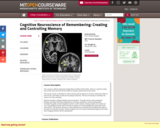
For undergraduates taking Course 9 IAP subjects for credit. See IAP Guide for details.
- Subject:
- Psychology
- Social Science
- Material Type:
- Full Course
- Provider:
- M.I.T.
- Provider Set:
- M.I.T. OpenCourseWare
- Author:
- Wagner, Anthony
- Date Added:
- 01/01/2002

For undergraduates taking Course 9 IAP subjects for credit. See IAP Guide for details.
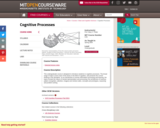
An introduction to human information processing and learning; topics include the nature of mental representation and processing; the architecture of memory; pattern recognition; attention; imagery and mental codes; concepts and prototypes; reasoning and problem solving.

This is a class about applying autonomy to real-world systems. The overarching theme uniting the many different topics in this course will center around programming a cognitive robotic. This class takes the approach of introducing new reasoning techniques and ideas incrementally. We start with the current paradigm of programming you're likely familiar with, and evolve it over the semester—continually adding in new features and reasoning capabilities—ending with a robust, intelligent system. These techniques and topics will include algorithms for allowing a robot to: Monitor itself for potential problems (both observable and hidden), scheduling tasks in time, coming up with novel plans to achieve desired goals over time, dealing with the continuous world, collaborating with other (autonomous) agents, dealing with risk, and more.

How genetics can add to our understanding of cognition, language, emotion, personality, and behavior. Use of gene mapping to estimate risk factors for psychological disorders and variation in behavioral and personality traits. Mendelian genetics, genetic mapping techniques, and statistical analysis of large populations and their application to particular studies in behavioral genetics. Topics also include environmental influence on genetic programs, evolutionary genetics, and the larger scientific, social, ethical, and philosophical implications.

This seminar examines the history and legacy of the Cold War on American science. It explores scientist's new political roles after World War II, ranging from elite policy makers in the nuclear age to victims of domestic anti Communism. It also examines the changing institutions in which the physical sciences and social sciences were conducted during the postwar decades, investigating possible epistemic effects on forms of knowledge. The subject closes by considering the place of science in the post-Cold War era.
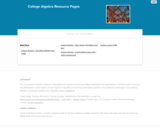
This course covers relations and functions, specifically, linear, polynomial, exponential, logarithmic, and rational functions. Additionally, sections on conics, systems of equations and matrices and sequences are also available.
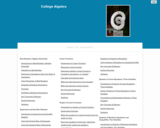
It is often said that mathematics is the language of science. If this is true, then the language of mathematics is numbers. The earliest use of numbers occurred 100 centuries ago in the Middle East to count, or enumerate items. Farmers, cattlemen, and tradesmen used tokens, stones, or markers to signify a single quantitya sheaf of grain, a head of livestock, or a fixed length of cloth, for example. Doing so made commerce possible, leading to improved communications and the spread of civilization.
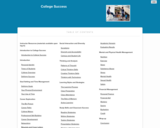
The focus of this textbook is preparing students for a college education with the study and life skills they need to become successful students.

This course is designed to equip you with the tools to succeed during your college career. Simply attending school for many years is no guarantee that you have a clear understanding of the specific strategies needed to get what you want out of college. This course will provide the opportunity for you to learn and practice methods that will assist you in identifying and reaching your academic and career goals.

Textbook for introductory composition, focusing on writing processes, essay writing, and research writing.
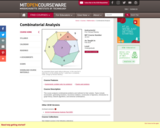
This course analyzes combinatorial problems and methods for their solution. Topics include: enumeration, generating functions, recurrence relations, construction of bijections, introduction to graph theory, network algorithms, and extremal combinatorics.
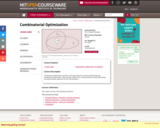
Thorough treatment of linear programming and combinatorial optimization. Topics include network flow, matching theory, matroid optimization, and approximation algorithms for NP-hard problems. 18.310 helpful but not required.
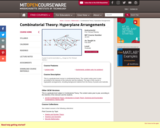
Content varies from year to year. An introduction to some of the major topics of present day combinatorics, in particular enumeration, partially ordered sets, and generating functions. This is a graduate-level course in combinatorial theory. The content varies year to year, according to the interests of the instructor and the students. The topic of this course is hyperplane arrangements, including background material from the theory of posets and matroids.
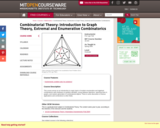
Content varies from year to year. An introduction to some of the major topics of present day combinatorics, in particular enumeration, partially ordered sets, and generating functions. This course serves as an introduction to major topics of modern enumerative and algebraic combinatorics with emphasis on partition identities, young tableaux bijections, spanning trees in graphs, and random generation of combinatorial objects. There is some discussion of various applications and connections to other fields.
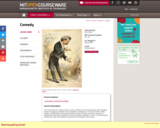
This course looks at comedy in drama, novels, and films from Classical Greece to the twentieth century. Focusing on examples from Aristophanes, Shakespeare, Cervantes, MoliĚŹre, Wilde, Chaplin, and Billy Wilder, along with theoretical contexts, the class examines comedy as a transgressive mode with revolutionary social and political implications. This is a Communications Intensive (CI) class with emphasis on discussion, and frequent, short essays.
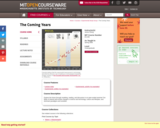
Explore the future through modeling, reading, and discussion in an open-ended seminar! Our fields of interest will include changes in science and technology, culture and lifestyles, and dominant paradigms and societies.

In an increasingly interconnected world, communicating across cultures is a crucial skill in the international networks of business, science, and technology. Subject examines a range of communication styles and techniques resulting from different cultural norms and traditions. It begins with a general theoretical framework and then moves into case studies. Topics include understanding the relationship between communication and culture, differences in verbal and non-verbal communication styles, barriers to intercultural communication, modes of specific cross-cultural communication activities (e.g. argumentation, negotiation, conflict resolution) and intercultural adjustment. Case studies explore specific ways of communicating in Asian and European cultures. Graduate students are expected to complete additional assignments. Taught in English.It has become commonplace knowledge that globalization is one of the major forces shaping our world. If we look at the spread of information, ideas, capital, media, cultural artifacts--or for that matter, people--we can see the boundaries and borders that have historically separated one country or one group from another are becoming more and more permeable. For proof of this close to home, you need only to look at the composition of the MIT student body: 8 percent of the undergraduates and 37 percent of the graduate students are from 109 different countries. "Communicating Across Cultures" is designed to help you meet the challenges of living in a world in which, increasingly, you will be asked to interact with people who may not be like you in fundamental ways. Its primary goals are to help you become more sensitive to intercultural communication differences, and to provide you with the knowledge and skills that will help you interact successfully with people from cultures other than your own. We hope the course will accomplish those goals by exposing you to some of the best writers and scholars on the subject of intercultural communication, and by giving you a variety of opportunities to practice intercultural communication yourself. As you read the syllabus for this course, we hope you get a sense of our commitment to making this course a rewarding experience for you.

In order to be effective, leaders need a high tolerance of complexity. Beyond this, they need to inform their people and the outside world of their strategies, policies and decisions. Effective leaders are often inspiring communicators – their own high tolerance of complexity helps them reduce this complexity to a concise and powerful message.
Your sensemaking mindset is therefore of critical importance to motivate others to follow and support you. Your ability to inspire and convince is largely dependent on the way you frame your message, and on your skills at playing the game of framing and reframing. You will learn from a large variety of (video) cases and analyse a large number of situations where leaders’ communication and sensemaking skills are tested and probed. This will ensure that you are equipped to build winning coalitions in your own organization.
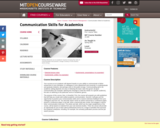
Seminar focuses on the communication skills needed for a career in academia. Topics include writing for academic journals, preparing and delivering conference papers and job talks, peer reviewing for journals and conferences, and teaching. Participants are expected to work on a written project and deliver an oral presentation based on their current research. Restricted to doctoral students who have completed their first year. Your success as an academic will depend heavily on your ability to communicate to fellow researchers in your discipline, to colleagues in your department and university, to undergraduate and graduate students, and perhaps even to the public at large. Communicating well in an academic setting depends not only on following the basic rules that govern all good communication (for example, tailoring the message to meet the needs of a specific audience), but also on adhering to the particular norms of academic genres. The purpose of this course, then, is threefold. First, the course will acquaint you with guidelines that will help you create well-crafted academic communication. Second, it will give you the opportunity to practice your communication skills and to receive extensive feedback from your colleagues and from me. You will write and/or revise an article manuscript or conference paper, present a conference paper or job talk, write a manuscript peer review, and engage in various other communication exercises. The article and talk, which are the major assignments of the course, will be based on material from your own doctoral studies. Third, the course will provide an opportunity for you to learn about professional norms for a range of activities that surround the academic enterprise, including, for example, the scholarly publication process and the job search process.
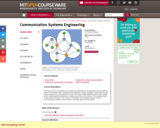
This course will cover fundamentals of digital communications and networking. We will study the basics of information theory, sampling and quantization, coding, modulation, signal detection and system performance in the presence of noise. The study of data networking will include multiple access, reliable packet transmission, routing and protocols of the internet. The concepts taught in class will be discussed in the context of aerospace communication systems: aircraft communications, satellite communications, and deep space communications.